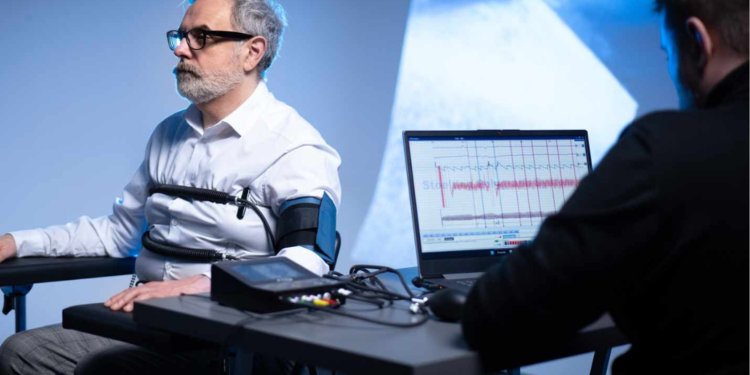In recent years, lie detector tests, also known as polygraph tests, have become increasingly popular in the UK. Once considered a tool primarily used in criminal investigations, lie detector tests are now sought after for a range of situations—from resolving personal relationship disputes to addressing issues in the workplace. This growing demand reflects a broader societal need for truth, transparency, and accountability in a variety of settings.
In this article, we will explore the reasons behind the increased demand for lie detector test services in the UK, how the tests work, and their applications in different contexts. We will also examine the legal and ethical considerations surrounding their use.
Table of Contents
What Is a Lie Detector Test?
A lie detector test, or polygraph test, measures physiological responses such as heart rate, blood pressure, respiration, and skin conductivity. The underlying theory is that when a person lies, they experience stress or anxiety, which causes measurable changes in their body. A polygraph machine records these changes through sensors attached to the individual’s body during the test.
The test consists of both control and relevant questions. Control questions are used to establish a baseline of normal physiological responses, while relevant questions focus on the specific issue being investigated. By comparing the individual’s physiological responses to control and relevant questions, the examiner can determine whether their responses indicate deception.
While the accuracy of polygraph tests has been debated, they are widely used in various settings as a tool for assessing truthfulness and resolving disputes. Their rising popularity in the UK is a testament to the value people place on getting clear answers when trust is at stake.
Why Is the Demand for Lie Detector Tests Growing in the UK?
- Increased Trust Issues in Personal Relationships
One of the most significant drivers behind the growing demand for lie detector test UK is the rise of trust issues in personal relationships. Infidelity, dishonesty, and betrayal can cause deep emotional pain and lead to the breakdown of romantic partnerships, friendships, and even familial relationships. When suspicions arise, individuals may seek clarity to either confirm or dispel their doubts.
Lie detector tests offer a way to address these suspicions and provide answers. For example, if a partner suspects infidelity but lacks concrete evidence, a polygraph test can help verify whether their partner is being truthful about their actions. In some cases, the results of the test can help rebuild trust and move the relationship forward. In other cases, the test may confirm dishonesty, allowing the individuals involved to make informed decisions about the future of the relationship.
The growing emphasis on transparency and honesty in personal relationships, coupled with a desire for closure in emotionally charged situations, has made lie detector tests an appealing option for many people in the UK.
- Workplace Integrity and Security Concerns
Another significant factor contributing to the rise in demand for lie detector test services is the growing concern for workplace integrity and security. Employers in the UK are increasingly using polygraph tests to address issues such as employee theft, fraud, and misconduct. In today’s business environment, where data security, financial integrity, and trustworthiness are paramount, businesses cannot afford to overlook potential risks posed by dishonest employees.
Polygraph tests are often used in investigations where an employer suspects that an employee has engaged in unethical or illegal behavior. For example, if a company experiences unexplained financial losses or a breach of confidential information, they may use a polygraph test to determine whether a specific employee is responsible.
Additionally, lie detector tests may be used as part of pre-employment screening processes for roles that require a high level of trust and responsibility. This is especially common in industries such as finance, law enforcement, and security, where the integrity of employees is critical to the success of the organization.
The rise of remote work and the increasing reliance on digital platforms have also heightened concerns about data breaches and employee loyalty. As a result, businesses are turning to lie detector tests as a way to protect their assets, maintain security, and ensure the honesty of their workforce.
- Family Disputes and Legal Matters
Lie detector tests are also being used to resolve disputes in family matters, such as inheritance disagreements, custody battles, and accusations of financial misconduct. In situations where family members accuse one another of dishonesty or wrongdoing, the emotional stakes can be high, and resolving the issue may require an objective assessment of the truth.
For example, in cases of contested wills or accusations of misappropriating family funds, a lie detector test can help clarify whether a family member has acted dishonestly. Similarly, in custody disputes, a polygraph test may be used to verify claims of inappropriate behavior or misconduct that could impact the welfare of a child.
While polygraph test results are not legally binding in the UK and cannot be used as evidence in court, they can provide valuable information that helps family members resolve conflicts and make informed decisions.
- High-Profile Cases and Public Awareness
Another contributing factor to the rising demand for lie detector tests in the UK is increased public awareness of their use in high-profile cases. Media coverage of prominent cases involving polygraph tests has raised awareness of the tool’s potential to uncover the truth in complex situations. Television shows and films depicting the use of lie detectors in crime investigations and reality TV have also contributed to the growing public interest.
As more people become familiar with the concept of lie detector tests, they are increasingly seen as a viable option for resolving personal and professional conflicts. This has led to a surge in demand for polygraph services, not only in high-profile cases but also in everyday disputes.
How Lie Detector Tests Work in the UK
If you are considering using a lie detector test to address a trust issue, it is important to understand the process and what to expect. In the UK, the procedure typically involves the following steps:
- Pre-Test Interview: Before the test begins, the examiner conducts a pre-test interview with the person taking the test. During this interview, the examiner explains how the polygraph works, reviews the questions that will be asked, and ensures that the individual understands the process. The pre-test interview helps establish a rapport between the examiner and the test-taker, which is essential for accurate results.
- Test Setup: The individual is connected to the polygraph machine, with sensors placed on their body to monitor physiological responses. The test is conducted in a controlled environment to minimize distractions and stressors that could affect the results.
- Questioning: The examiner asks a series of questions, including both control questions (designed to establish a baseline) and relevant questions related to the issue being investigated. The individual’s physiological responses are recorded and analyzed to determine whether their responses indicate truthfulness or deception.
- Post-Test Analysis: After the test, the examiner analyzes the data and provides a report on the findings. The results are typically discussed in a post-test interview, where the examiner explains whether the individual’s responses suggest truthfulness or deception.
Legal and Ethical Considerations for Lie Detector Tests in the UK
While the demand for lie detector tests is growing, it is important to be aware of the legal and ethical considerations surrounding their use. In the UK, polygraph tests must be conducted voluntarily, and the individual taking the test must provide informed consent. Coercion or forcing someone to take a polygraph test is not allowed.
Additionally, the results of a lie detector test are not admissible as evidence in UK courts. This means that while the test can provide valuable insight into a situation, it cannot be used as definitive proof of guilt or innocence in legal proceedings.
Conclusion
The growing demand for lie detector test services in the UK reflects a broader societal need for truth, transparency, and accountability. Whether used to resolve personal relationship issues, address workplace concerns, or settle family disputes, lie detector tests offer a valuable tool for uncovering the truth and helping individuals make informed decisions.


 Home
Home









